Key takeaways:
- Customer experience conferences foster dynamic environments where professionals share diverse insights and strategies to enhance customer interactions.
- Anonymity at conferences encourages open dialogue, particularly on sensitive topics, allowing attendees to share honestly without fear of judgment.
- Utilizing digital tools and creating non-identifiable spaces enhances anonymous participation, leading to richer discussions and innovative ideas.
- Maximizing anonymity benefits requires creating a safe environment and integrating anonymous feedback into ongoing conversations for sustained openness and connection.
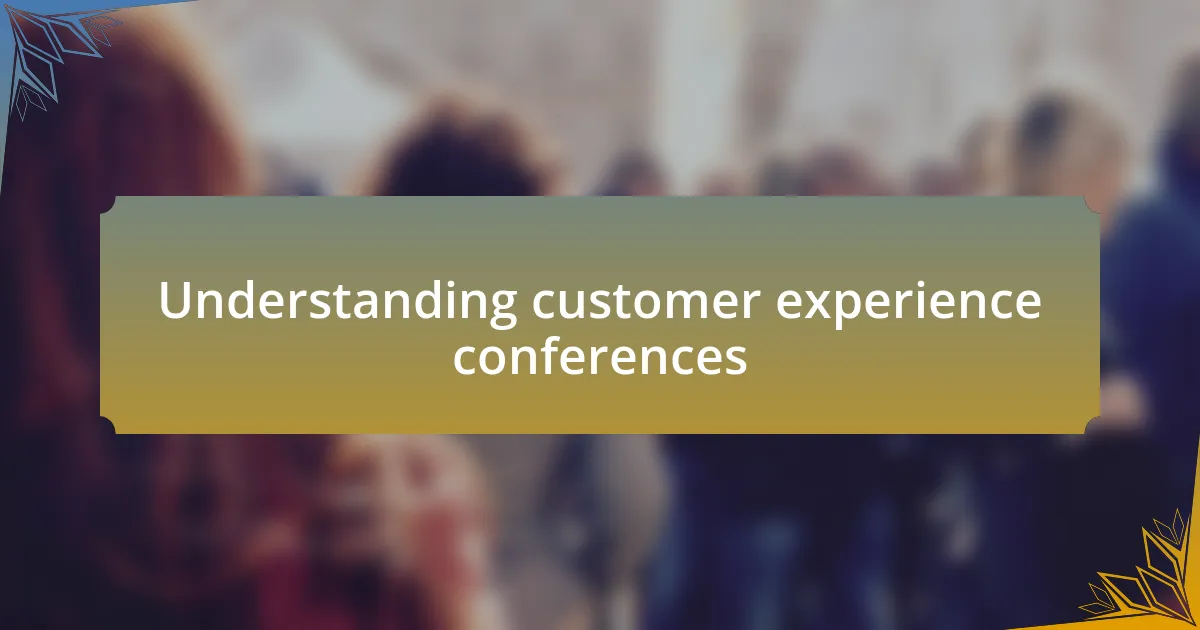
Understanding customer experience conferences
Customer experience conferences serve as vibrant hubs for professionals dedicated to enhancing customer interactions. For me, attending my first conference was eye-opening; I walked into a room brimming with passionate individuals eager to share their insights. It struck me how everyone had unique stories, illustrating the diverse approaches to understanding customer needs.
At these events, the atmosphere buzzes with energy, as thought leaders share strategies that can be immediately applicable to our own businesses. I remember one speaker’s tale about turning around a struggling service by genuinely listening to customer feedback—it was a transformative moment for me. Have you ever had an experience where a single idea changed your perspective? That’s the power of these gatherings.
Through networking opportunities and hands-on workshops, customer experience conferences offer practical tools and ideas that can do wonders for your organization. I can distinctly recall a breakout session where the facilitator demonstrated a simple feedback loop that significantly improved customer satisfaction in her company. Isn’t it fascinating how sharing experiences can spark innovation and elevate our understanding of customer journeys?
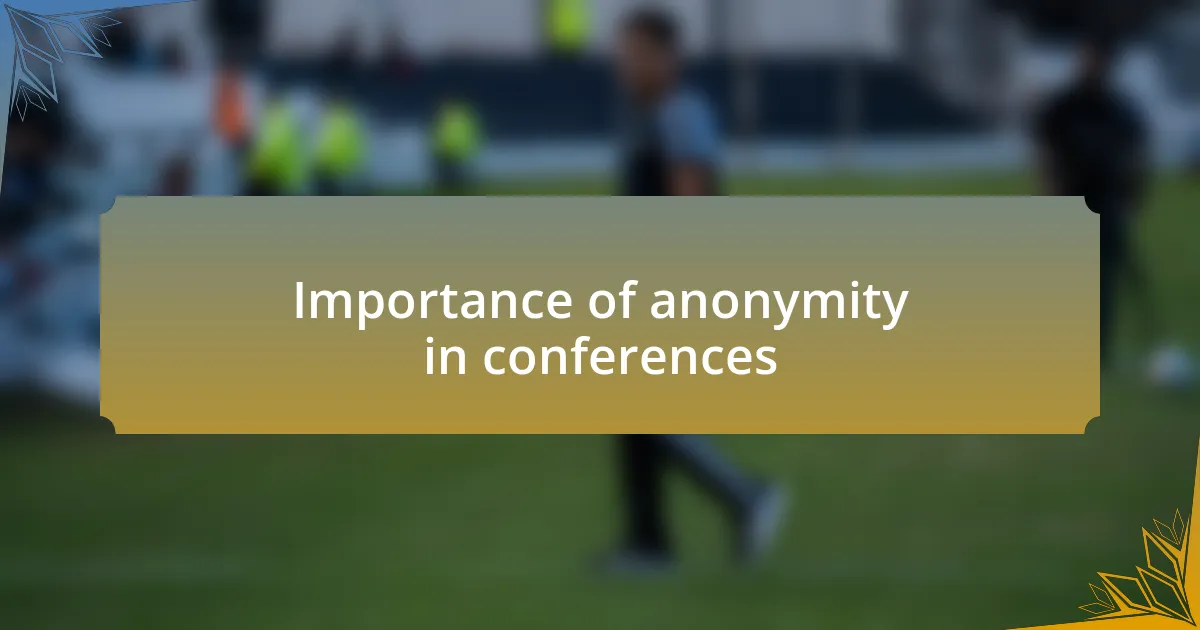
Importance of anonymity in conferences
In my experience, anonymity at conferences can create a unique sense of freedom for attendees. I recall a moment when I quietly contributed to a discussion without the pressure of revealing my identity. This allowed me to express my thoughts freely, encouraging others to do the same. Isn’t it interesting how being anonymous can lead to more honest and open conversations?
The importance of anonymity is especially pronounced when discussing sensitive topics, such as failures in customer experience. I once participated in a session where participants shared their struggles in a candid manner, unburdened by the fear of judgment. This openness fostered a supportive environment that encouraged learning from each other’s missteps. How often do we get the chance to engage in such vulnerable dialogues?
Moreover, anonymity can encourage participation from those who might otherwise feel hesitant to speak up. During one conference, I noticed several attendees taking advantage of anonymous Q&A platforms to ask probing questions. Their courage to engage without the weight of their titles was inspiring. Have you ever felt more comfortable to share when the spotlight isn’t fully on you? This anonymity not only enriches the discussion but also generates a diverse range of ideas, enhancing the overall experience for everyone involved.
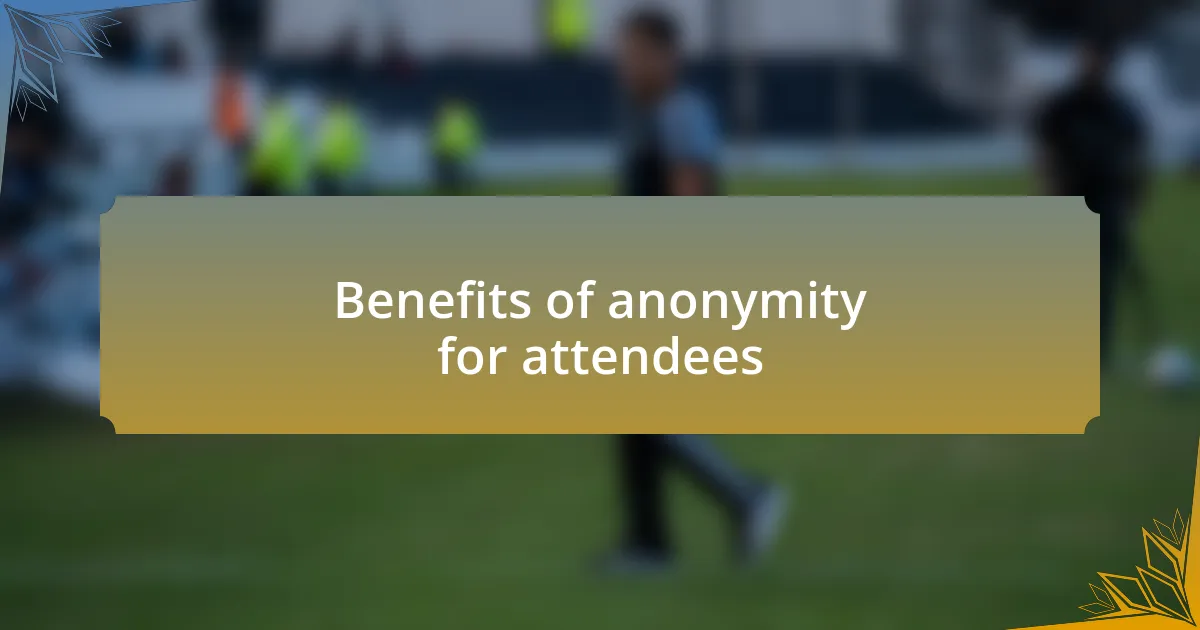
Benefits of anonymity for attendees
Attending a conference with the option of anonymity can feel like stepping into a safe space. I recall one particular session where a participant shared a deeply personal experience related to customer dissatisfaction. Because they chose to remain anonymous, their story struck a chord with many of us, allowing for a genuine exchange of ideas without the fear of being identified. Does it not spark a sense of community when you can share and learn from each other’s experiences without the burden of your name?
Anonymity also levels the playing field, creating an environment where every voice matters equally. I remember being in a breakout group where a quieter attendee, who typically wouldn’t speak up, posed an insightful question while remaining anonymous. The idea that anyone could contribute, irrespective of their position or background, enriched our discussion significantly. Wouldn’t you agree that it’s empowering to have your thoughts valued on the same level as others?
Lastly, the freedom to explore controversial topics without attachment can lead to innovative solutions. There was an instance when I witnessed a debate on emerging customer service strategies. An anonymous attendee proposed a rather unconventional approach that would likely have faced criticism if shared openly. The resulting conversation was dynamic and thought-provoking. How often do you wish to discuss bold ideas without lingering judgment? That’s the beauty of anonymity—it encourages creativity and risk-taking in a supportive atmosphere.
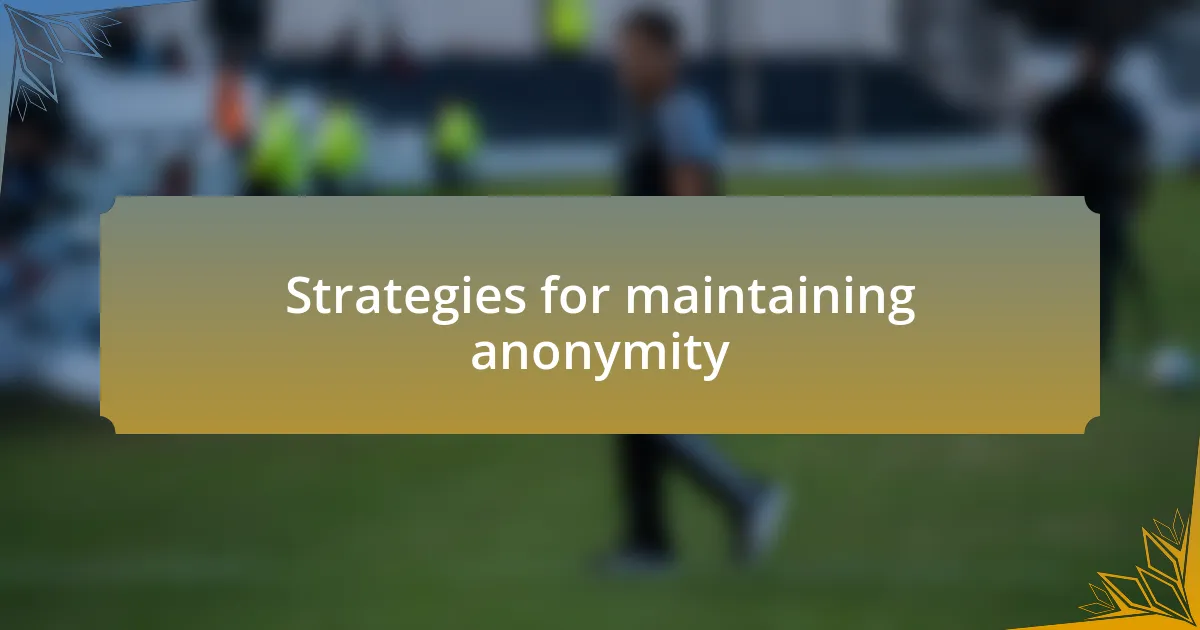
Strategies for maintaining anonymity
One effective strategy for maintaining anonymity at conferences is to utilize digital platforms for feedback and discussions. In my experience, using anonymous online polls or discussion boards allows attendees to express their thoughts openly without the anxiety of being judged. I remember participating in a session where we used an app for real-time feedback, and it fostered an environment where everyone felt secure sharing their true sentiments. Isn’t it interesting how technology can bridge the gap between fear and transparency?
Another approach involves implementing non-identifiable badges or tokens. At a previous conference, I noticed that participants were assigned colors based on their discussion groups instead of names. This small change created an atmosphere of comfort, enabling attendees to connect on concepts rather than identities. How powerful is it to exchange ideas without the constraints of titles or affiliations?
Finally, creating designated “safe spaces” where anonymity is prioritized can significantly enhance the conference experience. I once attended a workshop specifically designed for sensitive topics, where the facilitator encouraged participants to share stories anonymously on sticky notes. The heartfelt responses placed on the wall were a testament to the openness this method inspired. Don’t you think fostering such environments can lead to deeper understanding and healing among attendees?
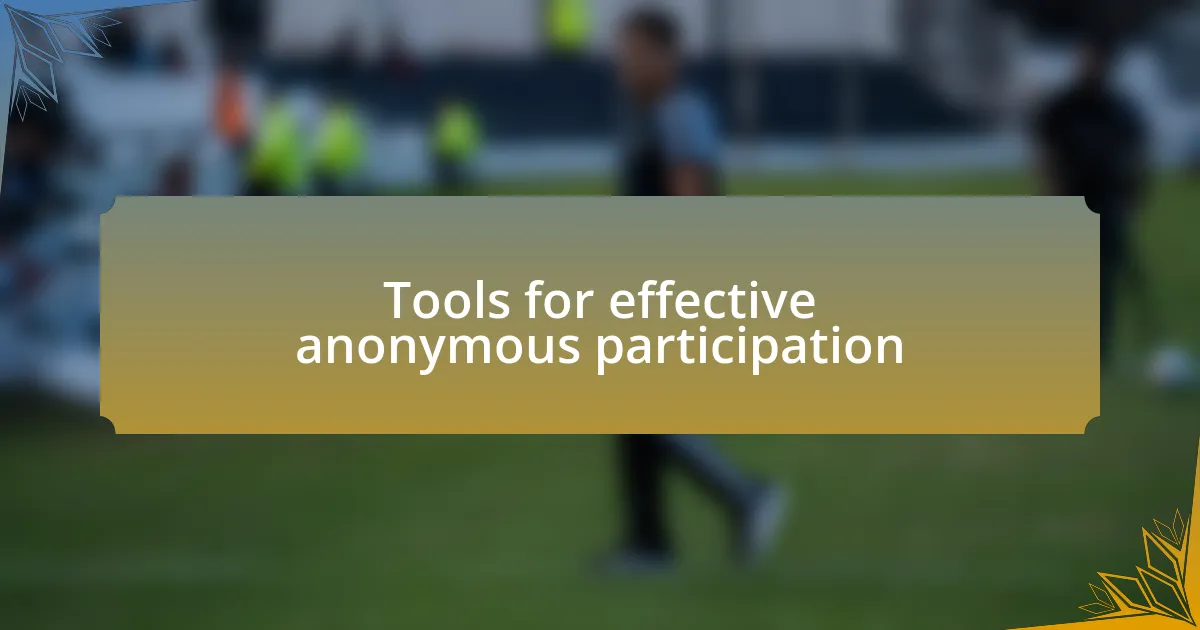
Tools for effective anonymous participation
One of the most effective tools I’ve encountered for anonymous participation is the use of dedicated apps that facilitate real-time interaction. I once attended a tech conference where we used an app that allowed participants to submit questions and vote on them anonymously. The experience was eye-opening; it encouraged even the most reserved attendees to weigh in, leading to rich discussions that might have otherwise been stifled. Can you imagine the difference it makes when everyone can engage without fearing reprisal?
Another useful tool is the incorporation of anonymous chat features during sessions. While moderating a panel, I had the opportunity to monitor a live chat where audience members could ask anything without revealing their identities. It was fascinating to see how this encouraged more candid questions, which ultimately enriched the dialogue on stage. It made me realize, isn’t it freeing to voice what’s on your mind without holding back?
Survey tools are also invaluable for gathering anonymous feedback post-session. I remember using a platform that collected participant thoughts without revealing their identities, allowing everyone to express honest opinions about the content and presenters. The insights gathered were invaluable for future planning and demonstrated a commitment to improving the experience. How often do we get the chance to learn so directly from our peers?
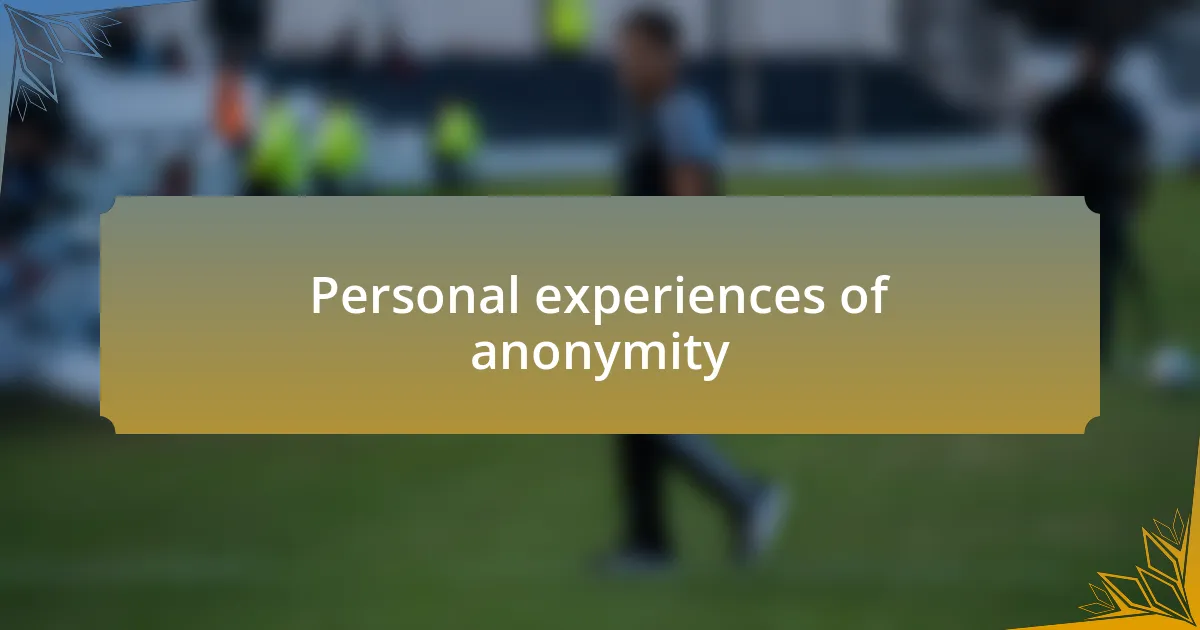
Personal experiences of anonymity
When I think about my encounters with anonymity, one experience stands out vividly. At a workshop, participants were encouraged to share their thoughts on sensitive topics without revealing their names. As I poured my heart out about my challenges in the industry, I felt an exhilarating sense of freedom. It was remarkable to express myself authentically, knowing that my vulnerability would not be judged.
In another instance, during a team-building exercise, we used a digital platform that allowed anonymous input on team dynamics. I was surprised by the depth of honesty that surfaced. Comments regarding workplace issues flowed in, and I realized how many people were grappling with similar feelings. Has there ever been a moment where you’ve felt a weight lifted simply because you could speak your truth without fear?
These experiences have reinforced my belief in the power of anonymity. It creates a unique space where individuals can share not only ideas but also emotional struggles, tapping into a shared humanity that often gets lost in conventional settings. How often do we ignore the voice of dissent simply because it remains silent? Anonymity doesn’t just encourage opinions; it fosters connection.
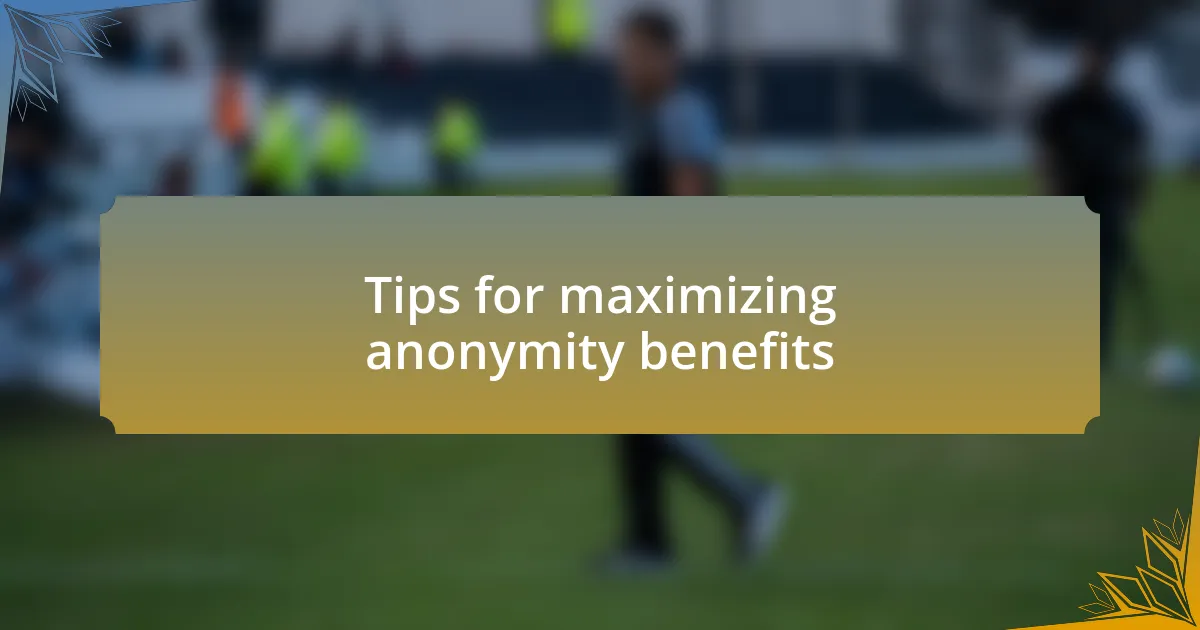
Tips for maximizing anonymity benefits
To truly maximize the benefits of anonymity, it’s crucial to create a safe environment where everyone feels comfortable sharing. I remember moderating a feedback session where we used a platform that didn’t show identities. It struck me how participants opened up about their ideas and criticisms without the fear of backlash. Have you ever noticed the honesty that flows when people aren’t tethered to their names?
Another effective approach is to set clear guidelines on what can be discussed anonymously. In one instance, we created prompts that encouraged deep reflection, which led to more thoughtful responses. It was enlightening to see how specific questions prompted richer conversations. What if the key to unlocking greater insights is simply providing the right context?
Lastly, consider integrating anonymity into ongoing discussions rather than using it as a one-off tool. I’ve experienced how continuous anonymous feedback can cultivate a culture of openness over time. It’s amazing to think how regular opportunities for anonymous sharing can lead to sustained improvements in team dynamics. Isn’t it empowering to think that anonymity can lead to more authentic connections?